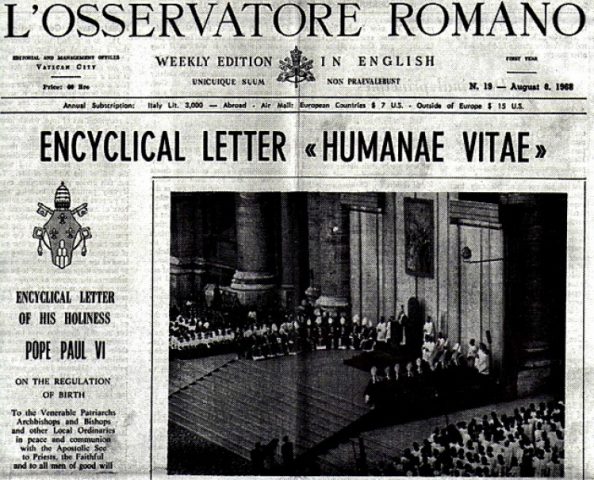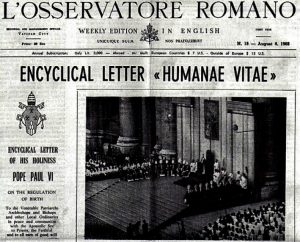Note: The first part of this essay appeared last Saturday and may be read by clicking here. In that earlier portion, Professor Brugger deals with the details of how Paul VI wrote his encyclical and of the opposition he faced. It ended with an explanation of how the pope conceived of the absolute inseparability of the unity of the spouses and the procreative dimension in every sexual act that is morally licit.
 Another way to phrase this is to say that unity and procreation are intrinsic goods of the marital act. They are its goods precisely because they are defining goods of marriage itself. Marriage is a unitive and procreative type of friendship. The sexual act that takes its name from that friendship – the marital act – is likewise a unitive and procreative type of act.
Another way to phrase this is to say that unity and procreation are intrinsic goods of the marital act. They are its goods precisely because they are defining goods of marriage itself. Marriage is a unitive and procreative type of friendship. The sexual act that takes its name from that friendship – the marital act – is likewise a unitive and procreative type of act.
People may engage in all sorts of sexual acts, but only sexual acts that are unitive and procreative in type are conjugal – are marital – acts. If the actors in any sexual act reject either or both of the goods of marriage, then the act, whatever else it is, is not a marital type of act. This follows logically from Pope Paul’s unity/procreation paradigm.
Thus, if a husband forces himself sexually upon his wife, the act, as John Paul II affirmed, is not a marital type of act, but rather an act of rape. Likewise, if he or she does anything with the specific intent to render their intercourse non-procreative, the act, not being a procreative type of act, but one that – by intent – has been rendered sterile, is also not a marital type of act.
Since only martial sexual acts are justifiable, these non-marital types of acts are judged to be always wrongful. This is what is meant by the much-maligned term “intrinsically evil” as it is applied to contraception: it means such acts can never be chosen in a way that conduces to the integral well being of the marriage.
This logic is quite tight and constitutes the central normative part of the Catholic teaching on conjugal chastity. Whatever else is variable about that teaching – and there are several things: the linguistic formulations by which the truths are communicated; the people who officially communicate them (once only clerics and religious, now including laypeople); the ages to whom they are first communicated, etc. – whatever else is changeable, the truths concerning the nature of marriage and the consequent moral implications for sexual activity are unchanging and unchangeable.
Marriage is an exclusive, comprehensive, procreative one-flesh communion of persons; and sexual acts that intentionally reject either the unitive or procreative goods of the marriage are non-marital and hence not morally legitimate.
To defend the integrity of these sacred but vulnerable truths, Pope Paul VI authoritatively declared in paragraph 14 that “any action which either before, at the moment of, or after sexual intercourse, is specifically intended to prevent procreation – whether as an end or a means [is intrinsically evil].”
By formulating the norm as he did, the pope declares his own judgment about the morality of the birth control pill, a pill that is taken before sexual intercourse with the specific intent to prevent procreation.
What follows this declaration is full of wisdom and very much worthwhile reading. Here I can do no more here than touch on highlights.
The pope debunks the principal argument – from “totality” – put forward by the pro-contraception majority of his commission. He praises responsible parenthood and recommends to couples who have serious reasons to limit the size of their families to have recourse to natural fertility cycles. But he predicts several dire social consequences should a widespread use of contraception take root throughout the world.
Therefore, he urges public authorities, scientists, medical professionals, and Christian married couples to defend and support the goods of marriage within their respective domains of influence.
Finally, he ends with two paragraphs, terribly painful to read, that are addressed to his priests and brother bishops. They are painful not because of what he says, which is beautiful, wise, and filled with paternal solicitude and pastoral urgency, but painful because we know now, from our broken vantage point fifty years later, that the majority – the vast majority – of the priests and bishops to whom the pope’s words were lovingly addressed, did at best hide them under a bushel basket – and at worst outright disdained them.
The distinguished Catholic journalist and social commentator Russell Shaw recently imagined here what a “re-reading” of the Catholic teaching on contraception might look like refracted through the lens of the so-called “new paradigm.” He noted that it would teach the following:
The Church cherishes and upholds as an ideal for husbands and wives that each and every act of marital intimacy be open to new life, and married couples ideally should will and do nothing directly to impede that possibility. But in the circumstances of the present day, the Church, as a loving and merciful mother, does not seriously expect all couples to live by this ideal and does not pass harsh judgment on those who don’t.








